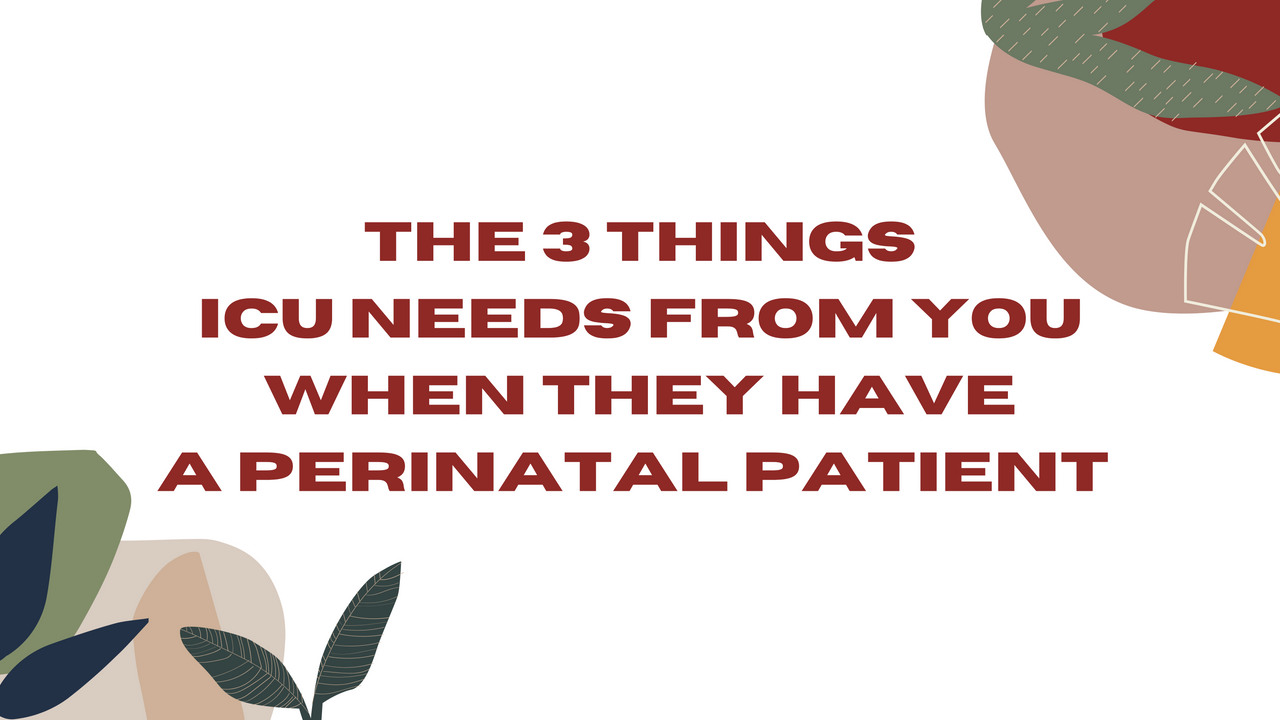The 3 Things ICU Needs from You When They Have a Perinatal Patient

If you are a maternity nurse in the United States in 2021, you will have patients that are in the ICU. It’s not just a hypothetical: it will absolutely happen regardless of where you work. There is more cardiovascular disease (like cardiomyopathy), hypertensive disorders (like HELLP and pre-eclampsia) and postpartum hemorrhages now than in decades past. We tackled much of the physiology of these conditions, as well as the concept of weathering, which is a large underlying factor to the increases we see in our February blog (you can read it here).
No doubt the ICU can be pretty intimidating: there’s lines, monitors and unfamiliar clinicians everywhere. It’s so tempting to want to spend as little time as possible over there. But just like we will happily manage a labor, ICU nurses LOVE monitoring cardiac and respiratory status, dialing in drips and reading those invasive monitor printouts. What do ICU nurses not like? Funduses (fundi?). Also, breast pumps. And a few other things, to be honest. Which means, ICU needs OB just as much as we need them (Kynoch, Paxton, & Chang, 2010). It used to be that our patients could not be more different. Now, sometimes they are the very same person and these patients need our collaboration. Research tells us that the more OB and ICU nurses work as a team and play off of each other's strengths and knowledge, the better our patient outcomes will be.
So since this week is Nurses Week, I wanted to address how OB and ICU nurses can work together to ensure the best outcomes. We know awareness is the first step, but it’s a must to go a step further and talk about actionable steps. Let’s discuss the 3 biggest areas that we can help with in order to show our ICU nurses some love, and make sure our patients are cared for the best when faced with a stay in the ICU.
The Fundus
Your ICU nurse will appreciate you dearly if you give them a quick orientation on where your patient’s fundus is and how to monitor the lochia. Make sure they know you are always available to them and to let you know ASAP if there is a change in the fundus or a significant increase in lochia. CVICU nurses don’t address postpartum funduses regularly and will be heavily reliant on your skills. If they call because they detect a change, but it turns out to be non-significant, always thank them.
Breastfeeding Support
This is an important time to collaborate when it comes to managing breastfeeding. Since the patient has recently given birth, there will likely be a need to facilitate pumping. Be assured: the ICU team is likely completely unaware of how to effectively do this and will need your support and guidance as the OB nurse. Seriously, breast pumps aren’t really their thing. This is an important collaborative role that will make a big difference in the long run (Dauphinee, JD & Amato, K. 1997; Parker et. al 2015). It can look a few different ways and will be guided by the patient’s desires, health status, and level of consciousness. It can range from simply setting up the pump and teaching the patient, to answering questions, to actually being in charge of the breastmilk collection. When the pregnancy or delivery has gone so awry, it can be a source of solace to the patient to be able to still provide colostrum or breastmilk to the neonate. In the unfortunate circumstance when the baby has been lost, helping the patient navigate and manage breastmilk suppression will fall to the OB nurses.
Postpartum Depression
Last is discharge teaching and planning, especially focusing on postpartum depression. Research (and common sense) tells us that complicated hospital stays and deliveries is associated with significant postpartum depression (Souza, Cecatti, Parpinelli, et. al 2009). Once they're past their acute phase, the OB clinicians are the best source to validate the trauma the patient and family has gone through. We can offer information on signs and symptoms of postpartum depression, let the patient and family know it’s expected, and plan for close monitoring, support and follow-up once the patient discharges home. Often OB has access to information on postpartum support groups and in-home services like public health nurses or doulas, and can begin discussing therapy or medication treatment options early.
Avoiding an ICU stay is still everyone’s preference. Up to 50% of maternal deaths (and many, many near-miss ICU admissions) are preventable and are due to a failure to intervene either early enough or thoroughly enough. Check with your hospital to see if there are formalized processes or workflows when this situation arises. How do you ensure all the patients needs are being met? Is there a policy or checklist? Also, what is the process for doing a root-cause analysis in these situations? If we want to work to dismantle the racial injustices leading to maternal health disparities, each of us, even bedside nurses, need to hold our practices and our organizations up to for inspection. But when you do find yourself with a patient requiring ICU care, remember: no matter how intimidating the ICU can feel for an OB nurse there are critical elements that require our expertise. If you want to show your ICU nurse some love, help them with the fundus, breastfeeding/pumping and getting the patient ready for discharge if they aren’t coming back to the maternity unit.
Let us know below in the comments what your favorite takeaway is or if you have other suggestions for ways OB nurses can help their patient in the ICU. If you’re an ICU nurse, what else would you add to the list?

